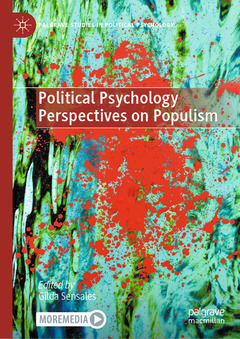Political Psychology Perspectives on Populism, 1st ed. 2024 Interpretations in Political Psychology Palgrave Studies in Political Psychology Series
Coordonnateur : Sensales Gilda

This book explores the different forms of populism in European countries. Starting from a theoretical point of view, the authors outline the various psychosocial precursors of populisms that have emerged from empirical investigations. Using both mainstream and critical perspectives, the book shows how the field has driven multiple research programmes and methodologies. The authors draw on questionnaires and political communication via social media to analyse the opinions, attitudes, and representations of laypeople and populist leaders. The volume is aimed at researchers, students, and readers with expertise on the subject. It collects contributions from scholars of social psychology, proposing an innovative reading of the social-cognitive, motivational, and emotional processes that can fuel populism.
1 Introduction.- Part I Transcultural Comparative Analyses.- 2 Political and Psychological Processes Contributing to European Populisms of the Left and Right.- 3 The Inner Logic: An Intergroup Approach to the Populist Mentality in Europe.- Part II Psychosocial Constructs in Action.- 4 COVID-19 Threat and Populism: The Mediated Effect of Epistemic and Significance Motivations.- 5 Conspiracy Ideation and Political Populism.- 6 Populist Thin Ideology: From a Theoretical Conceptualisation to the Development of a New Scale.- Part III The Italian Case.- 7 This is not the End. How the Appeal of Populism Changed Due to the COVID-19 Pandemic.- 8 Representations of Populism, Pandemic, and War among Italian Citizens of Different Political Orientations. A Psycho-Linguistic Analysis of their Associative Productions (2019-2022).- Part IV Populist Communication in the Blogsphere.- 9 Italian populist leaders and their followers on Facebook (2019-2022). Representational fields and empirical evidence from a psycho-social linguistic perspective.- 10 Double Bind or Political Advantage? The Negotiation of Womanhood in the Online Discourse of Female Right-Wing Populist Politicians.- 11 Concluding remarks.
Gilda Sensales is Associate Professor in Social and Political Psychology at the Sapienza University of Rome, Italy. Her main research interests are the representations of populism, political communication between mainstream and new media, gender and sexism in politics, and critical history of social psychology.
Date de parution : 05-2024
Ouvrage de 443 p.
14.8x21 cm
Thèmes de Political Psychology Perspectives on Populism :
Mots-clés :
conspiracies and populism; attitudes towards immigration and populism; need for closure and populism; authoritarianism and populism; social representations of populism; need for significance and populism; left and right populisms; populist leadership; Manichaeism and populism; war and populism; collective narcissism and populism; social media and populism; social psychology of populism; languages of populism; covid and populism; democracy and populism
